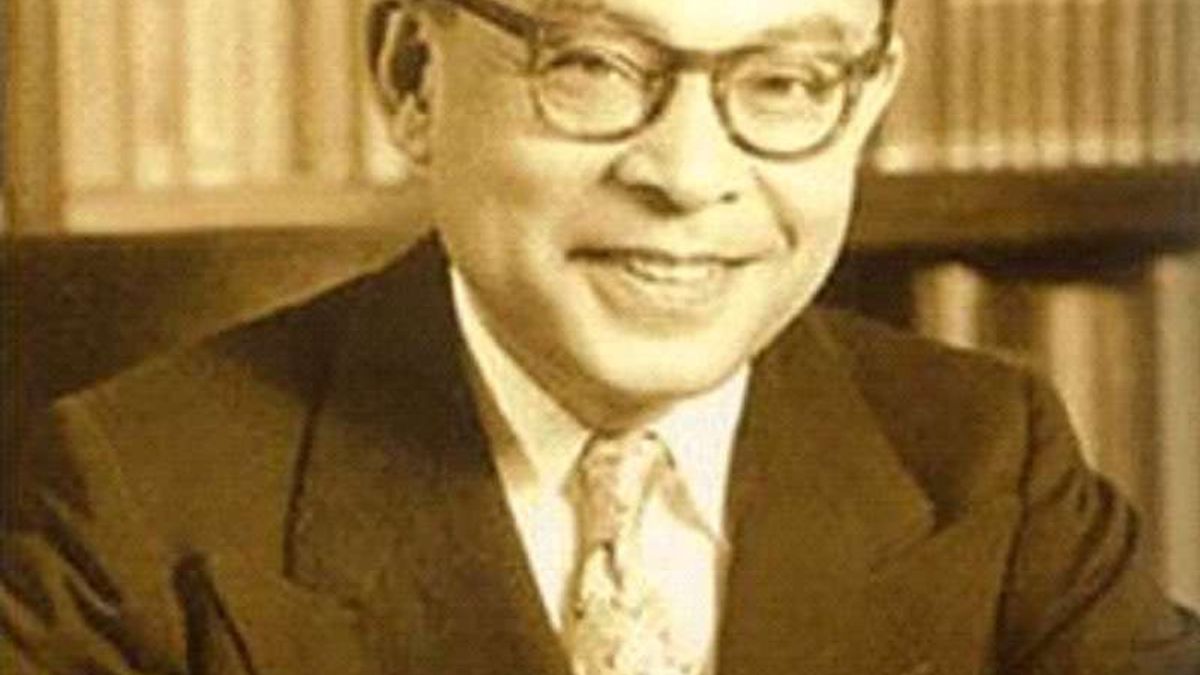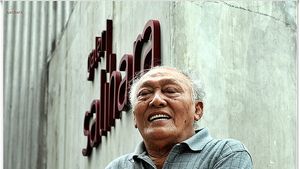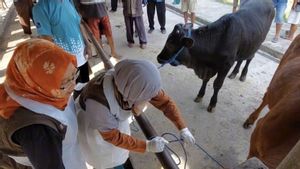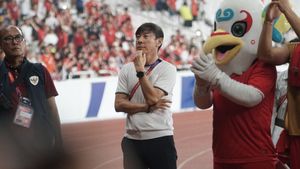JAKARTA - Who doesn't know Bung Hatta. The owner of the full name Mohammad Hatta is one of the leaders of Jong Sumatranen Bond who became Indonesia's first vice president (vice president).
One of these national heroes is known as Hatta, but this is not the first name he has. When he was born, his parents gave him the name Muhammad Athar. Bung Hatta was born in Bukittinggi on August 12, 1902 and died in Jakarta on March 14, 1980.
Apart from being an important figure in the independence and early days of Indonesian rule, Bung Hatta also played a major role in the country's economy through cooperatives. At the Indonesian Cooperative Congress on July 17, 1953, he received the title Father of Indonesian Cooperatives.
Bung Hatta was indeed a figure who was often side by side with Soekarno, but he did not accompany the first Indonesian President until the end of his term. In 1956, Bung Hatta resigned from his position as vice president because he was involved in a dispute with President Soekarno.
Bung Hatta's background and educationWhen he was a child, Bung Hatta pursued basic education at the Malay School, Bukittinggi. In 1913-1916, he continued his studies at Europeesche Lagere School (ELS) in Padang.
At the age of 13, Bung Hatta had actually passed the entrance exam to the Hoogere Burgerschool (HBS) in Batavia (currently Jakarta). The school is at the level of high school (SMA).
However, the mother wanted Hatta to stay in Padang because at that time he was still young. Bung Hatta then continued his studies at MULO in Padang. Quoted from eprints.uny.ac.id, in 1919 he went to Batavia to study at Prins Hendrik School (PHS).
In 1921, he studied trade / business at the Netherlands Handelshogeschool (currently Erasmus Universiteit), Rotterdam, The Netherlands. In that country he lived for 11 years.
The trail of the organization of one of the leaders of Jong Sumatranen Bond who became vice presidentWhen did Bung Hatta work in Jong Sumatranen Bond? All right, let's step back for a moment to trace the organizational history of Bung Hatta.
Hatta has been an active person in the organization since he was in middle school in Padang. One of the organizations he joined was Jong Sumatranen Bond Padang Branch with the position of treasurer. At that time he was only 15 years old.
Although he was still very young, Hatta's political awareness continued to grow because he was accustomed to attending political meetings or lectures. One of the political figures he idolized at that time was Abdul Moeis.
Quoted from perpusnas.go.id, young Hatta, who at that time was in Batavia, was active in Jong Sumatranen Bond Pusat. Again he served as treasurer.
Bung Hatta's world of organization continues. Since settling in the Netherlands in 1921, Bung Hatta joined the Indies Association (Indische Vereeniging).
In that organization, the climate for the movement has begun to be felt. Previously, Indische Vereeniging was nothing more than a meeting place for students from the archipelago. The climate of the movement began to emerge since three Indische Partij figures, namely Suwardi Suryaningrat, Douwes Dekker, and Tjipto Mangunkusumo, arrived in the Netherlands in 1913. The three of them came to the country as exiles because of the criticism they conveyed in writing in the De Expres newspaper.
This is inseparable from the role of Suwardi Suryaningrat (Ki Hadjar Dewantara) who initiated the publication of the Indische Vereeniging Indische Poetra magazine in 1916. The magazine contains information for students from the archipelago regarding conditions in the country. There was also criticism of Dutch colonialism.
Indische Vereeniging contains activists from various backgrounds, origins, and regions. So, there are no longer regional boundaries in the organization.
Bung Hatta's strugglesWe go back to when Bung Hatta started the world of organization, namely in Jong Sumatranen Bond (JSB) Padang Branch when he was 15 years old. At that time, Bung Hatta began to increase knowledge about the development of society and politics.
One of the ways he did it was reading various newspapers or newspapers. Not only newspapers published by Padang, but also newspapers published by Batavia. Through these writings, Hatta got to know the thoughts of one of the great figures in the movement, namely Tjokroaminoto.
Hatta knew Tjokroaminoto's thoughts when he read the writings in the Utusan Hindia newspaper. Apart from that, he also got to know Agus Salim's thoughts through Neratja.
As previously mentioned, one of the figures idolized by the young Hatta was Abdul Moeis. In his memorandum, Hatta admitted that he was engrossed in hearing Abdul Moeis' voice.
"I was amazed to see the way Abdul Moeis gave a speech, I was absorbed in listening to his melodious voice, half hoarse, fascinated by the swing he said. Until then, I had never heard a speech so great it attracted attention and burned my spirits, ”said Hatta.
Abdul Moeis is not an ordinary person. He is the author of the novel Salah Asuhan, an activist of the Sarekat Islam (SI) party, a member of the Volksraad, and an activist in the Indies Sarekat magazine, the Kaoem Moeda newspaper, Neratja, Hindia Baroe, Utusan Melayu, and Peroebahan.
When Hatta continued his studies in Batavia, he began to actively write. One of his essays was published in the Jong Sumatra magazine. The article is entitled My name is Hindania!
Young Hatta's thinking grew increasingly sharp. This is inseparable from several things, namely the various writings he read, his experience as a treasurer at the Central JSB, the conversations he had with movement figures from Minangkabau who lived in Batavia, and the discussions he had with fellow JSB members: Bahder Djohan.
He and Baher routinely tour the city on Saturdays. In this activity, they exchanged ideas about various matters related to the country. They also often discuss efforts to advance the Malay language.
When he became treasurer at Central JSB, Bung Hatta collaborated with the Neratja newspaper printing company. While he was in Rotterdam, the relationship continued. He is trusted as a correspondent.
At one point — in 1922 — an event took place that shocked Europe. Turkey, which at that time was seen as a collapsing empire, succeeded in repelling Greece.
Hatta monitored the incident and then put it in a series of writings for Neratja in Batavia. Hatta's writing attracted the attention of readers. Many newspapers in the country quoted Hatta's writings.
At Indische Vereeniging (1922), Bung Hatta again became treasurer. He was appointed to the position when the board was replaced, namely on February 19, 1922.
The moment at that time held an important meaning in the future because that was when they decided to change the name from Indische Vereeniging to Indonesische Vereeniging. Furthermore, changing the name Nederland Indie to Indonesia. In the forum, a member of the Indonesische Vereeniging said, from now on we are building Indonesia and eliminating the Indies or Nederland Indies.
In 1927, Bung Hatta joined the League against Imperialism and Colonialism in the Netherlands. It was during this time that Hatta established a good relationship with a nationalist from India, Jawaharlal Nehru. Activeness in this organization made Hatta arrested by the Dutch government. He was released after delivering his defense speech: Indonesia Free.
Bung Hatta returned to Indonesia in 1932. He joined the Indonesian National Education Club organization. This organization aims to increase the political awareness of the Indonesian people through training processes.
Hatta was again arrested by the Dutch in February 1934. This time with Soetan Sjahrir, chairman of the Indonesian National Education Club. Bung Hatta was then exiled to Digul and continued to Banda for 6 years. In 1945, Mohammad Hatta was appointed Vice President of Indonesia, accompanying Soekarno, who was then President.
Apart from the historical story of one of the figures from Jong Sumatranen Bond who became vice president, follow other domestic and foreign news only on VOI.id, Time to Revolutionize the News!
The English, Chinese, Japanese, Arabic, and French versions are automatically generated by the AI. So there may still be inaccuracies in translating, please always see Indonesian as our main language. (system supported by DigitalSiber.id)









